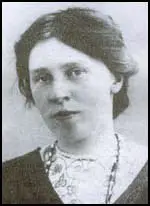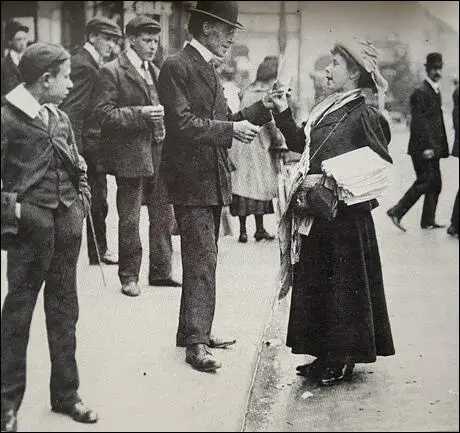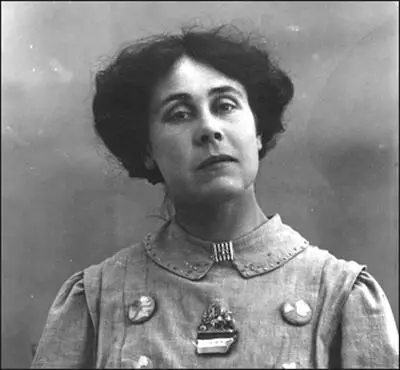Mary Phillips

Mary Phillips, the daughter of a doctor, W. Fleming Phillips, was born in Glasgow on 15th July, 1880. Her father held progressive political views and encouraged her to become involved in the women's suffrage movement. In 1904 she was employed as a paid organiser of the Glasgow and West of Scotland Association for Women's Suffrage.
Phillips was also a socialist and wrote a regular column in Forward, a "Scots Weekly journal of socialism, trade unionism, and democratic thought" in which she often commented on the subject of parliamentary reform. She gradually became convinced that "constitutional" agitation had failed.
Mary Phillips joined the Women's Social and Political Union and in June 1907 and established a WSPU branch in Glasgow. On 12th November, 1907, Christabel Pankhurst wrote to her and asked if she would be willing to help Helen Fraser run WSPU campaigns in Scotland. Fraser, was overworked as she was also employed at the Scottish Council for Women's Trades. Her first task was to run a WSPU campaign in East Fife.
In March 1908 Mary Phillips was arrested and sentenced to six-weeks in Holloway Prison after taking part in a WSPU demonstration outside the House of Commons. Her release was reported in Votes for Women. "On Friday morning the first batch of prisoners to be released from Holloway were met at the prison gates, and escorted in triumph, banners flying and bands playing, to Queen's Hall, where some 250 friends and supporters were waiting to give then a warm welcome." Mary Phillips was quoted as saying: "Tell Mrs Pankhurst and all the other friends that I am very, very glad to do all the other friends that I am very, very glad to do the three months, because I think it will be good for the cause. My only regret is that I have not two bodies, one to do the work outside as well as the one inside.
She was arrested again after taking part in the 30th June demonstration and this time she was sentenced to three months imprisonment. On her release she was greeted at the prison gates by Flora Drummond. According to Elizabeth Crawford, the author of The Suffragette Movement (1999): "On her release on 18th September she was greeted by a bevy of WSPU members, led by Flora Drummond, all of whom were attired in full Scottish regalia and accompanied by pipers. Mary Phillips and her parents were transported in a carriage pulled by the women from Holloway to the Queen's Hall."

After her release Phillips joined Annie Kenney, Elsie Howey, Gladice Keevil, Clara Codd and Mary Blathwayt in the WSPU West of England campaign. Blathwayt wrote in her diary: "This afternoon I helped Annie Kenney make her plans for a West of England campaign, I wrote out lists of towns and dates which are to be sent to Mrs. Pankhurst and Mrs. Pethick Lawrence." In November, 1908, Phillips was making speeches with Kenney and Blathwayt in Plymouth.
In January 1909 Phillips became WSPU organiser in Newcastle-upon-Tyne. That summer she was active in Cornwall and Devon. In July she was arrested with Vera Wentworth and Elsie Howey, after interrupting a public meeting being held by Lord Carrington in Exeter. All three women went on hunger-strike and were released. Emily Blathwayt recorded in her diary: "Elsie Howey, Vera Wentworth and Mary Phillips were arrested at Exeter and imprisoned for a week and it is said they are going through the hunger strike as the 14 have done. The crowds were with them outside Lord Carrington's meeting and all resisted police and two working men were arrested. The women would not pay the fine."
Mary Blathwayt recorded in her diary on 5th August that Mary Phillips was very ill and was "released when she took to fainting." Soon afterwards Emmeline Pankhurst wrote to Phillips saying: "my dear girl take care of yourself and do everything in your power to recover your health and strength."
In November 1909 Mary Phillips wrote to Christabel Pankhurst asking for permission to take part in more militant activity. Pankhurst replied: "Nothing would be more mistaken at the present time. On no account run the risk of it, as the work you have been doing recently would all go to pieces." Phillips obeyed these instructions and stayed out of trouble for the next three years.
Phillips visited Eagle House near Batheaston in July 1910 with Vera Wentworth. Their host, was Mary Blathwayt, a fellow member of the WSPU. Her father Colonel Linley Blathwayt planted a tree, a Picea Pungens Glauca, in her honour in his suffragette arboretum in a field adjacent to the house.

In April 1912 she had been congratulated on her success as the WSPU organiser in Plymouth and her salary had been increased from £2 10s to £2 15s a week. Mary Phillips was arrested in July 1912 during a demonstration in Chester. However, her fine was paid, without her consent, by a local sympathiser.
In July 1913 she was dismissed as a WSPU organiser. Christabel Pankhurst wrote that she had been dissatisfied with her work as a WSPU organiser: "I want to say that if we had thought you would have made a success of another district we should have asked you to take one. I did not wish to hurt you needlessly by saying what always has been felt at headquarters that you are not effective as a district organiser." Considering the previous positive comments it seems that there was another reason for her dismissal. According to Martin Pugh, the author of The Pankhursts (2001): "Like other organisers, Mary Phillips suffered from the members' reluctance to fund arson and other attacks on property." Emily Blathwayt had also recorded in her diary that Phillips had been having doubts about the militant strategy.
Mary Phillips now joined Sylvia Pankhurst, Keir Hardie, Julia Scurr, Mary Phillips, Millie Lansbury, Eveline Haverfield, Nellie Cressall and George Lansbury, in the establishment of the East London Federation of Suffragettes (ELF). An organisation that combined socialism with a demand for women's suffrage it worked closely with the Independent Labour Party. Phillips had previously described herself as a member of the "extreme left". Phillips also became involved in the production of a weekly paper for working-class women called The Women's Dreadnought. As June Hannam has pointed out: "The ELF was successful in gaining support from working women and also from dock workers. The ELF organized suffrage demonstrations and its members carried out acts of militancy."
Phillips became a full-time organiser for the East London Federation of Suffragettes on a salary of £2 a week. She lived about the ELF shop in Poplar and worked closely with May Billinghurst. In 1915 she joined the United Suffragists, working until February 1916 as its organiser in Southwark. She was later employed by the New Constitutional Society for Women's Suffrage, the Women's International League and the Save the Children Fund.
Elizabeth Crawford points out in The Suffragette Movement (1999): "From 1928 until 1955 she was editor of a Daily News Service for the brewing trade and after her retirement worked on a semi-voluntary basis with the Publications Department of the National Council of Social Service."
Mary Phillips died on 21st June 1969.
Primary Sources
(1) Votes for Women (6th August 1908)
On Friday morning the first batch of prisoners to be released from Holloway were met at the prison gates, and escorted in triumph, banners flying and bands playing, to Queen's Hall, where some 250 friends and supporters were waiting to give then a warm welcome….
Miss Mary Phillips said: "Tell Mrs Pankhurst and all the other friends that I am very, very glad to do all the other friends that I am very, very glad to do the three months, because I think it will be good for the cause. My only regret is that I have not two bodies, one to do the work outside as well as the one inside.
(2) Emily Blathwayt, diary entry (31st July, 1909)
Elsie Howey, Vera Wentworth and Mary Phillips were arrested at Exeter and imprisoned for a week and it is said they are going through the hunger strike as the 14 have done. The crowds were with them outside Lord Carrington's meeting and all resisted police and two working men were arrested. The women would not pay the fine. Annie Kenney expects to be taken soon herself, and asked Mary to go and manage for her in Bristol.
(3) Mary Blathwayt, diary entry (5th August, 1909)
The Bristol paper tells of Mary Phillips being in a dangerous state but she will be right now unless fever comes on. Miss Brackenbury is looking after her. Herbert Gladstone gets worried from every direction as he richly deserves. People in Parliament are always asking questions.
(4) Emily Blathwayt, diary entry (6th August, 1909)
Telegram from Elsie (Howey) and Vera (Wentworth) to say they were released and they carried out hunger strike to the end. Annie (Kenney) and Mary (Blathwayt) came. They say Mary Phillips was released when she took to fainting. She is getting on well.
(5) Emily Blathwayt, diary entry (15th September, 1909)
Mary Phillips who will stay here for night, coming from her home in Glasgow for Truro.... She is a militant but of a different nature and neither approves of stone throwing or running away. She planted the new tree and was photographed.

